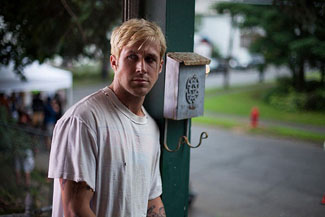|
|
BOP Interview: Derek CianfranceBy Ryan MazieMarch 27, 2013
On violence in film DC: I was thinking a lot about violence in movies. Mostly gun violence. Having kids, my perception was really changing. I started to have an allergic reaction to this cool violence I seen on the screen. I’ve always liked Sam Peckinpah, but with his violence I thought I was riding in the flames with the characters. But once I had kids, all of a sudden I was turning off the TV during commercials, because I didn’t want it to be a normal part of their lives. I see a lot of filmmakers nowadays choosing [an artistic visual style], doing the ballet of violence, seeing slow-motion bullets coming out of guns and into a brain and splattering the wall red. And I’m like, “It’s not beautiful.” It’s not cool. I don’t like the fetish of it. So I wanted to deal with violence in a narrative way. If I was going to put a gun in the film, I wanted it to have an impact. So all of a sudden, I started to think about this story of adrenaline and the choices that lead you to this violent moment where a gun comes in. There are three shots fired in this movie and I wanted them to have a consequence. A real narrative consequence. So this shot happens and as a viewer, you are like a person in the movie, you can’t go back from it. There is no sanctity of a flashback. Early on a lot of people said who read the script, “Why don’t you cut it up? It would be more marketable that way.” But to me, I’ve done it with Blue... It’s great the cross-cutted storytelling, but I thought the bravest choice to make with this film is to keep it chronological. It’s about lineage, so I needed it to be linear. This gun violence that happens in the movie happens to the audience and no one goes back from it. That moment is transcendent to me when I watch it, because when I see it I feel like there is a sense of denial that happens often times in the theater, like “No, that didn’t just happen. Bring him back now. When does he wake up in the hospital? Where’s the flashback?” … But he’s gone. On his fascination with intimacy DC: Ever since I was a kid, I was trying to film those moments of conflict. I never knew why my family had pictures of us smiling on the walls. We weren’t sitting around smiling on the time. When I went to my friend’s house, why there were pictures of their parents smiling when I heard them upstairs beating each other up? So I always was taking pictures of my brother in tears and my mom screaming at him, you know what I mean? On a family vacation to Disneyland, my dad blew a tire in the middle of the Arizona desert. He’s changing the tire with the traffic going next to him at 75 miles per hour, and he’s like, “Turn the fucking camera off.” It’s always what I’ve been drawn to. I feel like movies are filled with secrets and intimacies and so are families.
|

|
|
|

|
Friday, November 1, 2024
© 2024 Box Office Prophets, a division of One Of Us, Inc.


